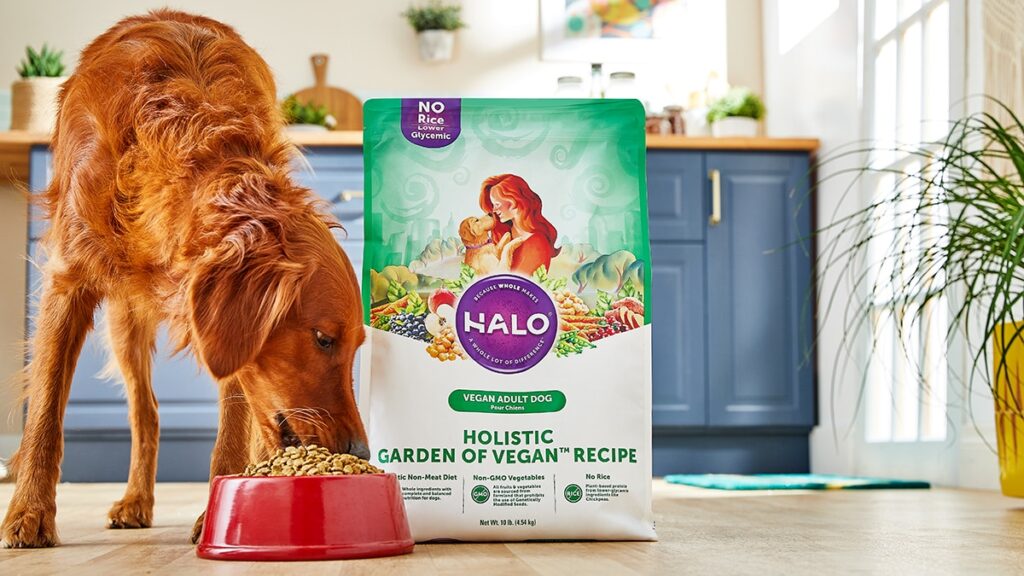Why Switch to a Vegan Diet for Dogs?

Photo by Chewy
With the current popularity of plant-based diets, it’s no surprise that many pet parents consider switching to a vegan diet for dogs. This especially is the case when the dog isn’t responding well to dog food that includes animal protein.
If you have heard about the potential benefits of a plant-based diet for people, you may be wondering whether a vegan diet could be a good choice for your canine companion. Or perhaps you’re most concerned about the environmental and animal welfare concerns associated with meat production. If any of this sounds familiar, let’s explore why plant-based canine diets increasingly are becoming well-received.
What is a Vegan Diet?
For people, the term vegan can mean an entirely different lifestyle—no meat, dairy, honey, leather, products that have been tested on animals, etc. For dogs, it simply means a diet devoid of animal products.
Typical mainstream dog food can include proteins from many animal sources, including:
- Chicken
- Beef
- Lamb
- Turkey
- Dairy
- Fish
- Green peas
- Chickpeas
- Pearled barley
- Pea protein powder
- Oats
- Soy
Why Switch to a Vegan Diet for Dogs?
Anyone who has dealt with dog food allergies knows that diagnosing and managing the condition can be difficult and expensive.
Common symptoms of dog food allergies include:
- Itchy skin
- Ear infections
- Digestive upset
- Chewing on the paws
- A variety of skin lesions that may improve with treatment but then reoccur
Some pet parents opt for an “elimination diet” to diagnose and manage dog food allergies. With this approach, dogs eat an extremely minimalistic diet, free of any common allergens, for several weeks.
If the symptoms subside, you know the dog has food allergies. Then, one at a time, you gradually add “regular” ingredients back into the diet. During this time, the dog requires close monitoring for re-emerging symptoms. Once you know exactly what your dog is allergic to—from process of elimination—you can select dog foods that do not contain those ingredients.
A recent study shows that the top food allergens for dogs, in descending order, are:
- Beef
- Dairy products
- Chicken
- Wheat
Complicating the situation, many dogs have multiple allergies and foods and treats can be labeled in a confusing manner. For example, a food may be called “beef dinner” but includes chicken.
With all of this, it’s easy to understand why some pet parents who are concerned about dog food allergies are opting for vegan dog food that, by its very nature, does not contain the most common allergens. Halo Holistic Garden of Vegan dry dog food and Halo Holistic Garden of Vegan canned dog food both offer a fully-balanced approach to canine nutrition. By choosing products like these—ones without meat, dairy, corn or wheat—you eliminate the most prevalent allergens altogether.
Transitioning to a Vegan Diet for Dogs
Any time you consider a change in your dog’s nutrition or health care program, it’s wise to discuss it with your veterinarian first. All dogs are individuals with their own health histories and needs.
When making the transition, keep in mind that there’s no need to rush. This applies whether your dog’s new diet is plant- or meat-based.
A popular approach is to gradually add some of the new food in with your dog’s old food. For example, you can start by offering a bowl consisting of 25 percent of the vegan dog food and 75 percent of the current food. Every few days, you can increase the new and decrease the old. During this period, watch your dog for any signs of gastrointestinal distress.
If you notice any problems, go back to your dog’s original food and transition even more slowly. If this does not do the trick, talk to your veterinarian.
"Treating" Your Dog the Vegan Way
Treats are an often-overlooked aspect of a dog’s nutrition. Conscientious pet parents can make a well-researched dietary change and forget about this bite-sized part of the program. No vegan diet for dogs is complete without comparable treats.
Naturally, the nutritional balance of dog treats is less crucial as treats are not the main source of a pup’s nutrition. Still, a healthy choice can aid with digestion, promote a vibrant coat and offer additional vitamins and minerals to your canine’s diet.
Complement your dog’s food with treats such as Halo Healthsome Garden of Vegan sweet potato, carrot and quinoa dog treats or Halo Healthsome Garden of Vegan peanut ‘n pumpkin dog treats. These vegan treats contain no artificial colors, flavors or preservatives.
Is Your Dog a Good Candidate for Veganism?
Dogs can thrive on a diligently chosen, nutritionally complete, plant-based food. I recommend purchasing products with an AAFCO (Association of American Feed Control Officials) nutritional adequacy statement on their labels. If you have any questions about how your particular dog can adapt to a vegan diet, talk to your veterinarian about transitioning smoothly.



